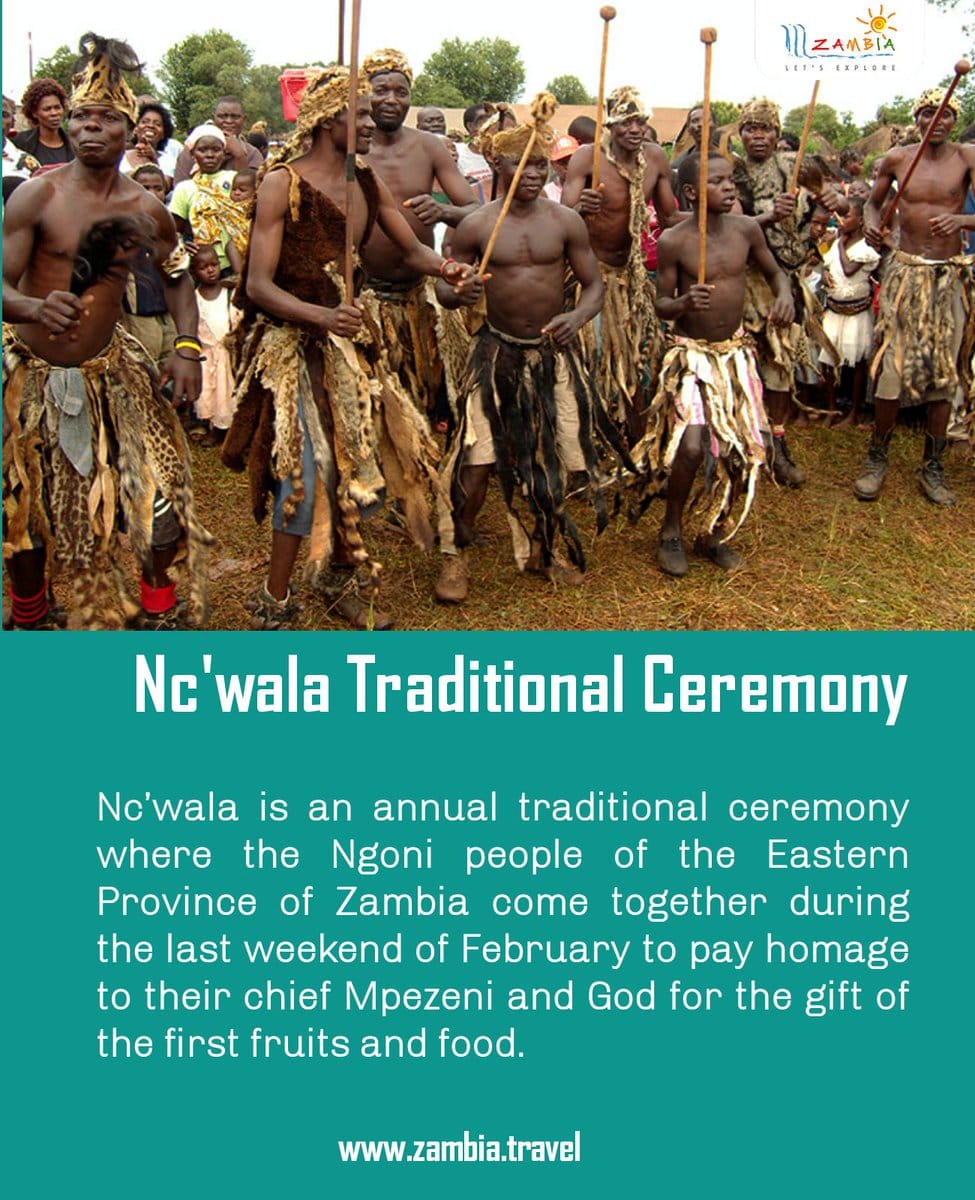What is celebrated during the Nc’wala Ceremony in Zambia?

- Understanding the Nc’wala Ceremony: A Cultural Overview
- Historical Significance of the Nc’wala Ceremony in Zambia
- Key Celebrations and Traditions During the Nc’wala Ceremony
- The Role of the Nc’wala Ceremony in Zambian Identity and Heritage
- How the Nc’wala Ceremony Promotes Community and Togetherness
Understanding the Nc’wala Ceremony: A Cultural Overview
The Nc’wala Ceremony is a significant cultural event celebrated by the Ngoni people of Zambia, particularly in the Eastern Province. This vibrant festival marks the end of the harvest season and is deeply rooted in the community's traditions and agricultural practices. Typically held in late February or early March, the Nc’wala Ceremony serves not only as a celebration of the bountiful harvest but also as a tribute to the ancestors and the spirits that guide the community.
Key Elements of the Nc’wala Ceremony
The Nc’wala Ceremony is characterized by a series of rituals and activities that highlight the Ngoni's rich heritage. Some of the key elements include:
- Traditional Dances: Various dance groups perform, showcasing colorful attire and intricate choreography that narrates historical events and cultural tales.
- Offerings to Ancestors: Rituals often involve offerings made to honor ancestors, reflecting the Ngoni's deep respect for their forebears and spiritual beliefs.
- Royal Participation: The ceremony is presided over by the chief, emphasizing the importance of leadership and community unity.
- Feasting: A communal feast featuring traditional dishes allows community members to come together, reinforcing social bonds and celebrating the harvest.
The ceremony is not just a festive occasion; it is a time for reflection and gratitude. Participants engage in storytelling, sharing tales of their ancestors and the history of their people, which serves to educate younger generations about their cultural identity. The Nc’wala Ceremony also fosters a sense of community pride and cohesion, as families and friends gather to celebrate their shared heritage.
Furthermore, the Nc’wala Ceremony attracts visitors from various regions, contributing to cultural exchange and tourism. As attendees witness the vibrant displays of traditional music, dance, and art, they gain insight into the Ngoni's way of life, making the ceremony a pivotal event for cultural preservation and appreciation. Through this rich tapestry of activities, the Nc’wala Ceremony stands as a testament to the enduring spirit and resilience of the Ngoni people.
Historical Significance of the Nc’wala Ceremony in Zambia
The Nc’wala Ceremony, celebrated annually by the Ngoni people in Zambia, holds profound historical significance that extends beyond mere festivities. This traditional event, which marks the harvest season, is rooted in the rich cultural heritage of the Ngoni community. The ceremony is not only a time for celebration but also a reflection of the tribe's history, identity, and resilience.
Origins of the Nc’wala Ceremony
The Nc’wala Ceremony is believed to have originated from the Ngoni's migration from present-day South Africa to Zambia in the early 19th century. This migration was driven by a quest for land and better resources. As they settled in their new homeland, the Ngoni people established the Nc’wala as a ritual to honor their ancestors and celebrate their survival and prosperity. The ceremony serves as a reminder of their journey and the struggles they overcame, reinforcing their cultural identity and unity.
Symbolism and Rituals
The rituals performed during the Nc’wala Ceremony are steeped in symbolism, representing the Ngoni people's connection to their land and agricultural practices. The central act of the ceremony involves the first fruits of the harvest, which are presented to the chief and the community. This act signifies gratitude for the bountiful harvest and reinforces the Ngoni’s agricultural roots. Traditional songs, dances, and the wearing of cultural attire further enrich the ceremony, emphasizing the importance of cultural preservation.
Community Cohesion and Identity
Beyond its agricultural roots, the Nc’wala Ceremony plays a crucial role in fostering community cohesion and identity among the Ngoni people. It brings together families and clans, strengthening social bonds and encouraging intergenerational dialogue. During the ceremony, stories of the past are shared, ensuring that younger generations remain connected to their heritage. This sense of belonging and collective identity is vital for the Ngoni community, particularly in a rapidly changing world where cultural practices may be at risk of fading.
Key Celebrations and Traditions During the Nc’wala Ceremony
The Nc’wala Ceremony, celebrated by the Ngoni people of Zambia, is rich in cultural significance and vibrant traditions. This annual event marks the end of the harvest season and serves as a tribute to the ancestral spirits. One of the most notable aspects of the Nc’wala Ceremony is the ritual of the first fruits, where the chief, adorned in traditional attire, offers the first fruits of the harvest to the gods and ancestors, seeking their blessings for the upcoming year.
Another key celebration during the Nc’wala Ceremony is the traditional dances and music that fill the air with joy and festivity. Groups of dancers, dressed in colorful costumes, perform intricate dances that showcase their cultural heritage. The rhythmic beats of drums and the melodic sounds of traditional instruments create an atmosphere of unity and celebration. These performances are not only entertaining but also serve as a means of passing down stories and teachings from one generation to the next.
Processions and feasting are also central to the Nc’wala Ceremony. The community gathers to partake in a grand feast that includes a variety of traditional dishes made from the freshly harvested crops. This communal meal symbolizes sharing and togetherness, reinforcing social bonds among the participants. Additionally, the presence of local leaders and dignitaries adds to the significance of the occasion, as they partake in the festivities and honor the cultural heritage of the Ngoni people.
Throughout the Nc’wala Ceremony, the symbolism of the lion plays a crucial role. The lion, representing strength and courage, is often featured in various forms of art and decoration. Participants may don lion masks during dances, and lion motifs can be seen in the ceremonial regalia. This tradition not only highlights the importance of the lion in Ngoni culture but also serves to instill a sense of pride and identity among the community members during this joyous occasion.
The Role of the Nc’wala Ceremony in Zambian Identity and Heritage
The Nc’wala Ceremony is a pivotal cultural event celebrated by the Ngoni people of Zambia, particularly in the Eastern Province. This annual festival, held in February, marks the end of the harvest season and is deeply intertwined with the identity and heritage of the Zambian people. The ceremony serves not only as a celebration of agricultural abundance but also as a reaffirmation of cultural values, traditions, and communal ties. Through vibrant displays of music, dance, and storytelling, the Nc’wala Ceremony encapsulates the essence of Zambian heritage, reinforcing a sense of belonging among participants and spectators alike.
Significance in Cultural Preservation
One of the primary roles of the Nc’wala Ceremony is its function as a means of cultural preservation. The event provides an opportunity for the younger generation to engage with and learn about their ancestral customs. Traditional rituals, such as the presentation of the first fruits to the chief, symbolize gratitude and respect for the land. These practices are not merely historical; they are actively passed down through generations, ensuring that the rich tapestry of Zambian culture remains vibrant and relevant. The ceremony also features traditional attire and crafts, highlighting the artistic expressions that are unique to Zambian identity.
Community Cohesion and Identity
The Nc’wala Ceremony plays a crucial role in fostering community cohesion among the Ngoni people and beyond. As families and friends gather to celebrate, the event strengthens social bonds and reinforces a collective identity. It serves as a platform for dialogue, where community members can discuss issues affecting their lives while celebrating their shared heritage. The inclusion of various cultural groups in the festivities also promotes unity and understanding among diverse ethnic backgrounds in Zambia, showcasing the country’s rich multicultural landscape.
Economic and Tourism Impact
Beyond its cultural significance, the Nc’wala Ceremony has substantial economic implications for the region. As thousands of visitors converge to witness the festivities, local businesses benefit from increased tourism. Artisans and vendors take advantage of the influx of tourists by selling traditional crafts and food, thus contributing to the local economy. This intersection of culture and commerce not only elevates the profile of the Nc’wala Ceremony but also underscores its importance as a symbol of Zambian identity on both a national and international stage.
How the Nc’wala Ceremony Promotes Community and Togetherness
The Nc’wala Ceremony, celebrated by the Ngoni people of Zambia, serves as a powerful catalyst for community bonding and social cohesion. This vibrant festival, which marks the end of the harvest season, invites not only the Ngoni but also neighboring tribes to participate, fostering a spirit of unity and collaboration. The communal aspect of the ceremony is evident as families come together to prepare traditional foods, dance, and share in the joyous festivities, creating a strong sense of belonging among participants.
Key elements that enhance community and togetherness during the Nc’wala Ceremony include:
- Shared Rituals: The ceremony features various rituals that require collective participation, reinforcing social ties and encouraging teamwork.
- Intergenerational Engagement: Elders pass down traditions and stories to younger generations, ensuring cultural continuity and strengthening familial bonds.
- Collective Celebrations: The communal feasting and dancing create a festive atmosphere, allowing individuals to connect and celebrate their shared heritage.
Additionally, the Nc’wala Ceremony emphasizes the importance of community values such as respect, cooperation, and mutual support. During this time, the community gathers to honor their ancestors and the spirits of the land, which serves to remind participants of their shared history and collective identity. This spiritual connection reinforces the bonds between community members, as they collectively engage in honoring their roots and acknowledging the contributions of their forebears.
Moreover, the ceremony acts as a platform for resolving conflicts and strengthening relationships within the community. By coming together in a festive environment, individuals have the opportunity to mend rifts and foster goodwill. The Nc’wala Ceremony, therefore, is not just a celebration of agricultural success; it is a vital event that enhances community spirit, nurtures interpersonal relationships, and promotes a harmonious social fabric.
Leave a Reply

Other celebrations and holidays